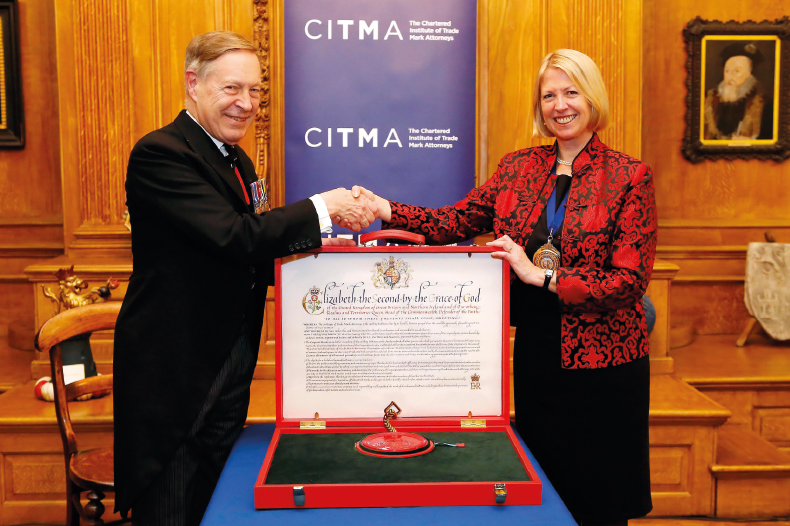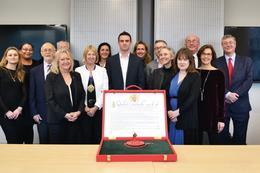What you told us about being chartered
To mark the fifth anniversary of our Royal Charter, we asked members what it means to them.

Hand-inscribed on vellum by illuminator to the Crown Office Timothy Noad, our Royal Charter is displayed proudly in a bespoke frame at the CITMA office.
But our Royal Charter is far more than just a combination of artistic talent and gold leaf; it showcases who we are as a proud profession and underlines the expertise and skill that CITMA members provide.
“I love being Chartered,” says Becky Campbell, an Associate at Mewburn Ellis. “It adds real gravitas to the profession and reassures clients that they’re dealing with someone who will give them a high level of service.”
When Lee Curtis, now a Partner at HGF, first joined the profession in 1993, his job title was Trainee Trade Mark Agent, which he says often led to confusion.
“I was often asked, ‘Is that like an estate agent?’ Over time, I became a Trade Mark Agent, a Trade Mark Attorney and finally a Chartered Trade Mark Attorney.
“What does the Chartered title give me? It shows that our profession is on a par with other Chartered professions.
It might also mean that the Queen understands that I am not an estate agent (no disrespect to estate agents).”
The royal seal
It was at Windsor Castle in spring 2016, at a meeting of the Privy Council, that the Institute of Trade Mark Attorneys (ITMA) was granted the Royal Charter.
This culminated in the Great Seal of the Realm being applied by the Crown Office in November 2016 and the Royal Charter legally coming into effect. Becoming Chartered was not a straightforward process; it was the culmination of a great deal of hard work.
Chris McLeod, Partner at Elkington + Fife and former CITMA President, recalls feeling “immense pride” when, as a profession, we were granted the status.
For him, it meant far more than just changing a job title or adding a credential to a website profile.
“Being able to refer to myself as a Chartered Trade Mark Attorney enables me to distinguish myself from an increasing number of competitors who are not.
"On a more general level, I think that it gives CITMA members more clout and enables us to gain new clients and reinforce relationships with existing ones, particularly when we can also say that we are regulated externally.”
This is a view backed up by many others, including Jennifer Heath, an Associate at D Young & Co. “In terms of the impact on the wider profession, being able to state to clients that you are a Chartered Trade Mark Attorney adds a certain weight to conversations and provides a further level of assurance,” she says.
“It has been an important and invaluable step to signify expertise.”
Many have joined the profession since we became a Chartered occupation. Alexandra Nott, a Chartered Trade Mark Attorney at Dehns, who started her training in 2016, says: “The significance of the Royal Charter is immense and was something I felt keenly, since I had only recently joined the profession when it was awarded.
"It was exciting to be starting my career in a field that was receiving recognition for its quality, skill and expertise, and it served as a reflection of the incredible talent of trade mark attorneys past and present and has inspired me to follow in their footsteps.”

Demonstrating best practice
Regulation and the rigorous process required to become a Chartered Trade Mark Attorney are things being Chartered can help you to demonstrate clearly.
As Azhar Sadique, a Partner at Keltie, says: “The Chartered status as applied to the profession has added another layer of professionalism and commitment to the standards that we are governed by.
“Given the change in the examination system and the ever-growing demand for expertise from our clients, I think it acts as a well-earned tip of the hat to professionals who have worked hard to qualify and act as Chartered Attorneys,” he adds.
“There is also a lot of trust in such a status, and it demonstrates immediately that, as a profession, we put our clients’ interests first.”
Chartered Trade Mark Attorney Becky Knott agrees. “Securing Chartered status ensures that the industry recognises the weight of what we do. It’s a seal of approval on our expertise.
"It has reinforced public trust in the profession, which leads to a greater volume of work and more opportunities. Being able to wear the ‘Chartered’ badge makes me very proud to work in the profession.”
Carol Nyahasha of Baron Warren Redfern feels that “being a Chartered Trade Mark Attorney gives you credibility, and the accreditation is good for the profession as a whole as it lifts the level of everyone to one of recognised professionalism, knowledge and skills.
"To me, being Chartered has meant having my experience validated to existing and future clients. It makes me very proud being a part of a professional body that sets high standards and holds itself and its members accountable for maintaining them.”
A proud moment
The honour of being President at the time of launching CITMA fell to Kate O’Rourke, now a Partner at Mewburn Ellis.
She recalls the warmth of the reaction and the joy she felt during “one of the proudest moments of her life”, when she was presented with the Royal Charter for the Chartered Institute of Trade Mark Attorneys at the College of Arms on 23rd November 2016.
“That day was the culmination of a great deal of hard work and dedication by a small group of people, particularly Keven Bader as Chief Executive, who was the main liaison between all of the parties with an interest in the process – not all of whom had supported our previous applications for Chartered status.
“To receive the Charter was to be recognised as the pre-eminent body for trade mark advice in the UK and meant that trade mark attorneys finally had formal status equivalent to our colleagues at CIPA, CILEX, the Law Society and the Bar Council.
"The congratulations I received after the announcement illustrated the respect that Chartered status brings to the profession and also showed the warmth of affection towards CITMA and its members from people all around the world.”
The feeling of trust and expertise extends well beyond our membership. At the time of launch, Mr Justice Arnold summed it up by saying: “The grant of a Royal Charter operates as a ‘kite mark’ certifying the quality of the body that provides the services – and, in the case of the Chartered Institute of Trade Mark Attorneys, what could be more appropriate?”
Read the full issue





